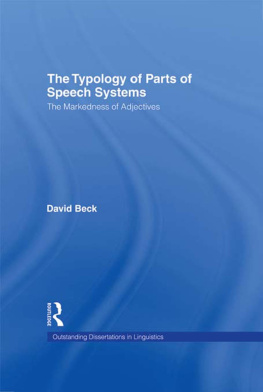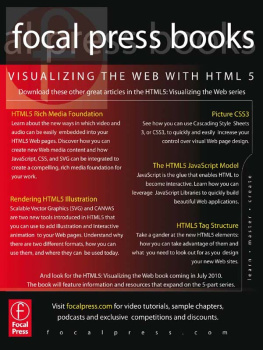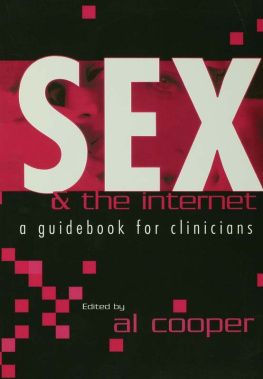Outstanding Dissertations in Linguistics
Edited by
Laurence Horn
Yale University
A ROUTLEDGE SERIES
Outstanding Dissertations in Linguistics
LAURENCE HORN, General Editor
NASALIZATION, NEUTRAL SEGMENTS AND OPACITY EFFECTS
Rachel Walker
PROSODY AND FOCUS IN EUROPEAN PORTUGUESE
Phonological Phrasing and Intonation
Soma Frota
LAYERS IN THE DETERMINER PHASE
Rob Zamparelli
PHONOLOGICAL RELATIONS BETWEEN WORDS
Laura Benua
CONSONANT STRENGTH
Phonological Patterns and Phonetic Manifestations
Lisa M. Lavoie
PATTERNS OF REDUPLICATION IN LUSHOQTSEED
Suzanne Urbanczyk
THE SERIAL VERB CONSTRUCTION PARAMETER
Osamuyimen Stewart Thompson
LONG-DISTANCE DEPENDENCIES
Mihoko Zushi
THE MORPIIOSYNTAX OF THE ALGONQUIAN CONJUNCT VERB
A Minimalist Approach
Julie Brittain
TURN-TAKING IN ENGLISH AND JAPANESE
Projectability in Grammar, Intonation and Semantics
MORPHOLOGICALLY GOVERNED ACCENT IN OPTIMALITY THEORY
John Alderete
MINIMAL INDIRECT REFERENCE
A Theory of the Syntax-Phonology Interface
Amanda Seidl
DISTINCTIVENESS, COERCION AND SONORITY
A Unified Theory of Weight
Bruce Morn
PHONETIC AND PHONOLOGICAL ASPECTS OF GEMINATE TIMING
William H. Ham
VOWEL REDUCTION IN OPTIMALITY THEORY
Katherine Crosswhite
AN EFFORT BASED APPROACH TO CONSONANT LENITION
Robert Kirchner
THE SYNCHRONIC AND DIACHRONIC PHONOLOGY OF EJECTIVES
Paul D. Fallon
GRAMMATICAL FEATURES AND THE ACQUISITION OF REFERENCE
A Comparative Study of Dutch and Spanish
Sergio Baauw
AUDITORY REPRESENTATIONS IN PHONOLOGY
Edward S. Flemming
The Typology of Parts of Speech Systems
The Markedness of Adjectives
David Beck
Published in 2002 by
Routledge
270 Madison Ave,
New York NY 10016
Published in Great Britain by
Routledge
2 Park Square, Milton Park,
Abingdon, Oxon, OX14 4RN
Routledge is an imprint of the Taylor & Francis Group
Transferred to Digital Printing 2010
Copyright 2002 by Routledge
All rights reserved. No part of this book may be reprinted or reproduced or utilized in any form or by any electronic, mechanical, or other means, now known or hereafter invented, including photocopying and recording, or in any information storage or retrieval system, without permission in writing from the publisher.
Library of Congress Cataloging-in-Publication Data
Beck, David, 1963
The typology of parts of speech systems: the markedness of adjetives /
David Beck.
p. cm. (Outstanding dissertations in linguistics)
Includes bibliographical references and index.
ISBN 0-415-94155-5
1. Grammar, Comparative and generalAdjective. 2. Markedness
(Linguistics) 3. Parts of speech. 4.. Semantics. 5. Grammar, Comparative and
generalSyntax I. Title. II. Series.
P273.B4 2002
415dc21 2002017900
Publisher's Note
The publisher has gone to great lengths to ensure the quality of this reprint but points out that some imperfections in the original may be apparent.
Contents
The requisitebut nonetheless genuinethanks are due to the members of my committee, Alana Johns, Jack Chambers, and Elan Dresher for their advice and encouragement, and for keeping an open mind. I would also like to thank Igor Mel'uk for his tireless enthusiasm, inspiration, and the copious donations of his time that I have been the beneficiary of. Paulette Levy's hospitality and friendship made my work in Mexico both pleasant and feasible. Without her assistance and the support of the Seminario de Lenguas Indgenas of the Universidad Nacional Autnoma de Mxico, none of it would have been possible. Thanks also go to Keren Rice for her helpfulness, which went a long way in making the pursuit of a doctoral degree a more rewarding task, and to Nila Friedberg, whose companionship made it a more fulfilling one.
Financial support for this dissertation came from a number of sources, principally a Doctoral Fellowship from the Social Sciences and Humanities Research Council of Canada (#752-96-1718). Support for my fieldwork on Toto nac came from a PRA Fellowship from the Organization of American States, as well as a travel grant from the School of Graduate Studies at the University of Toronto and two separate General Research Grants from the Department of Linguistics. Support for aspects of the fieldwork not directly related to this thesis was also received from Alana Johns' SSHRC-funded project on grammatical paradigms, which also funded what little work I was able to do on Inuktitut.
My final thanks go, of course, to the colleagues and consultants who are the ultimate sources of much of the data used in this thesis. The Lushootseed in particular was provided by Dr. T.M. Hess, who has over the years given me generous access to his data and his insights; the facts from Cora were brought to my attention by Vernica Vsquez, to whom I owe what understanding I have of this material. Paul Newman was kind enough to provide some of the Hausa examples used in this dissertation, and I am grateful to Ida Awa for having enough patience with me to provide some instruction in Inuktitut. The Mandinka data in are courtesy of Lamin Jabbi. My fieldwork on Totonac is owed completely to my consultants, in particular Porfirio Sampayo Macn, Longino Barragn, and Luciano Romero Aguilar. Alvaro Barragn Alvarez provided both language data and invaluable aid in setting up the practicalities of fieldwork; I am grateful to Doa Rosita for her words and her humour, and to Braulio Cevedeo, Bartolom Garca, Artemio Prez, Juan Ramrez Cortez, Zoyla Rivera Alvarez, and Manuel Romero for contributing their time and their knowledge of the language. Very special thanks are owed to Adolfo Gonzlez Amador and his familyLinda, Diana, Yofn, and Juanfor their friendship, and for making me feel a part of their clan.
| 1, 2, 3 = 1st, 2nd, 3rd person |
| ABL = ablative |
| ABS = absolutive |
| ACC = accusative |
| ACT = active |
| AGT = agentive |
| ALN = alienable |
| AP = antipassive |
| APPL = applicative |
| ART = article |
| AS = assertion |
| ATRB = attributive |
| CLS = classifier |
| CMP = completitive |
| CMT = comitative |
| CNF = confirmative |
| COL = collective |
| CONT = continuative |
| COP = copula |
| CS = causative |
| D = deictic |
| D f = feminine deictic |
| DVAC =dimension, age, value, colour |
| DEF = definite |
| DET = determinative |
| DIM = diminutive |
| DSD = desiderative |
| ECS = event-external causative |
| EMPH = emphatic |
| FEM = female |
| FUT = future |
| GEN = genitive |
| HAB = habitual |
| HREL = human relative |
| ICS = event-internal causative |
| IMPF = imperfective |
| INALN = inalienable |
| INSTR = instrumental |
| INTJ = interjection |
| INTR = intransitive |
| IRR = irrealis |
| LC = lack of control |
| LNK = linker |









